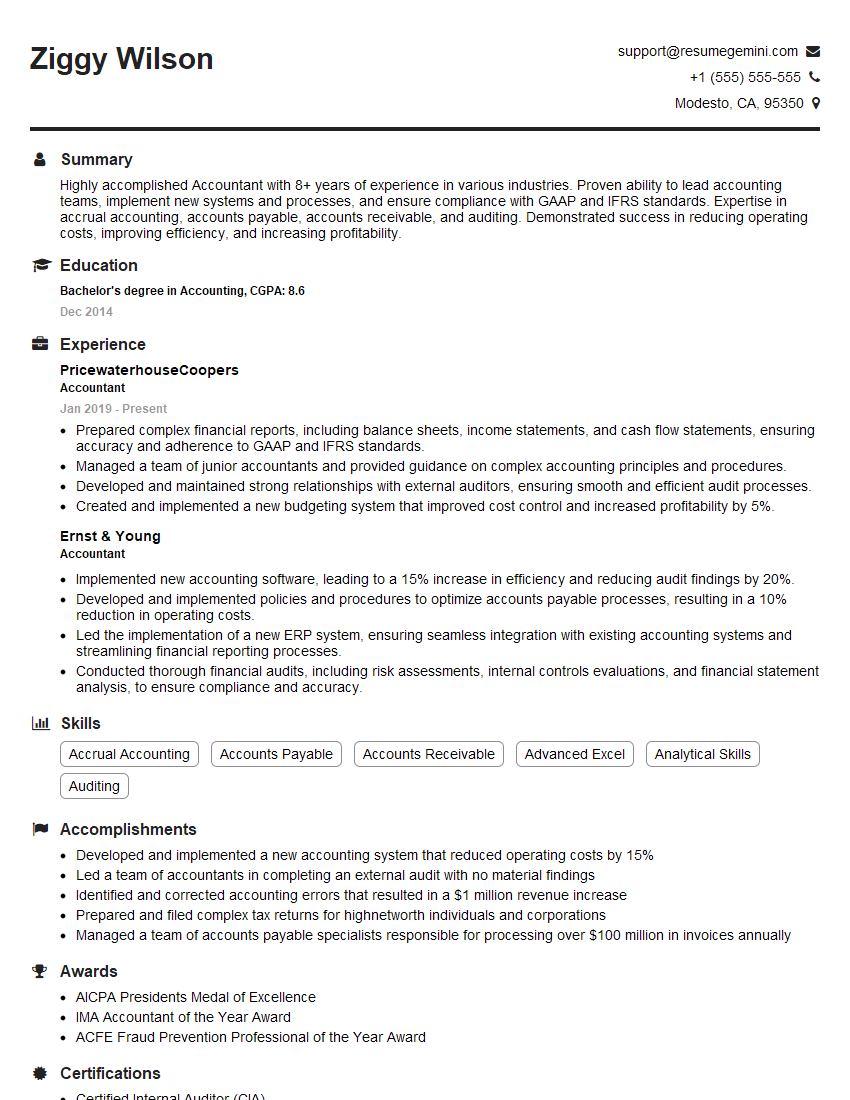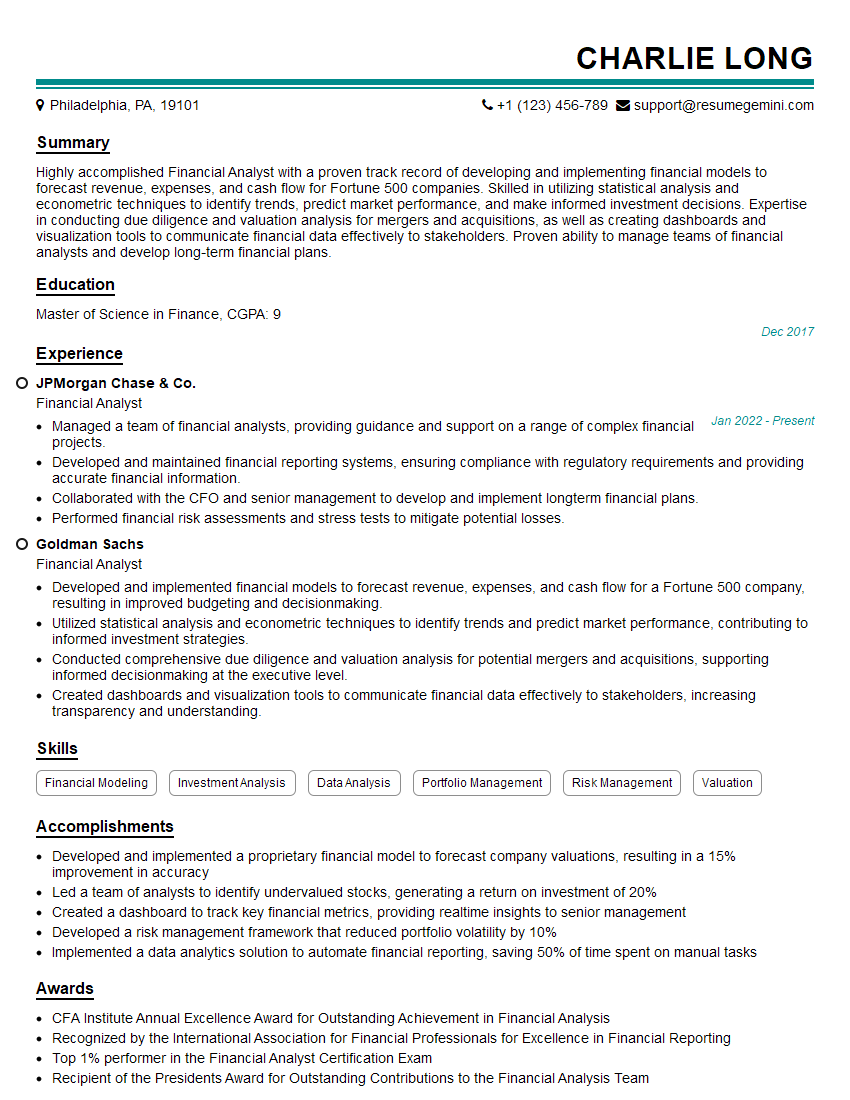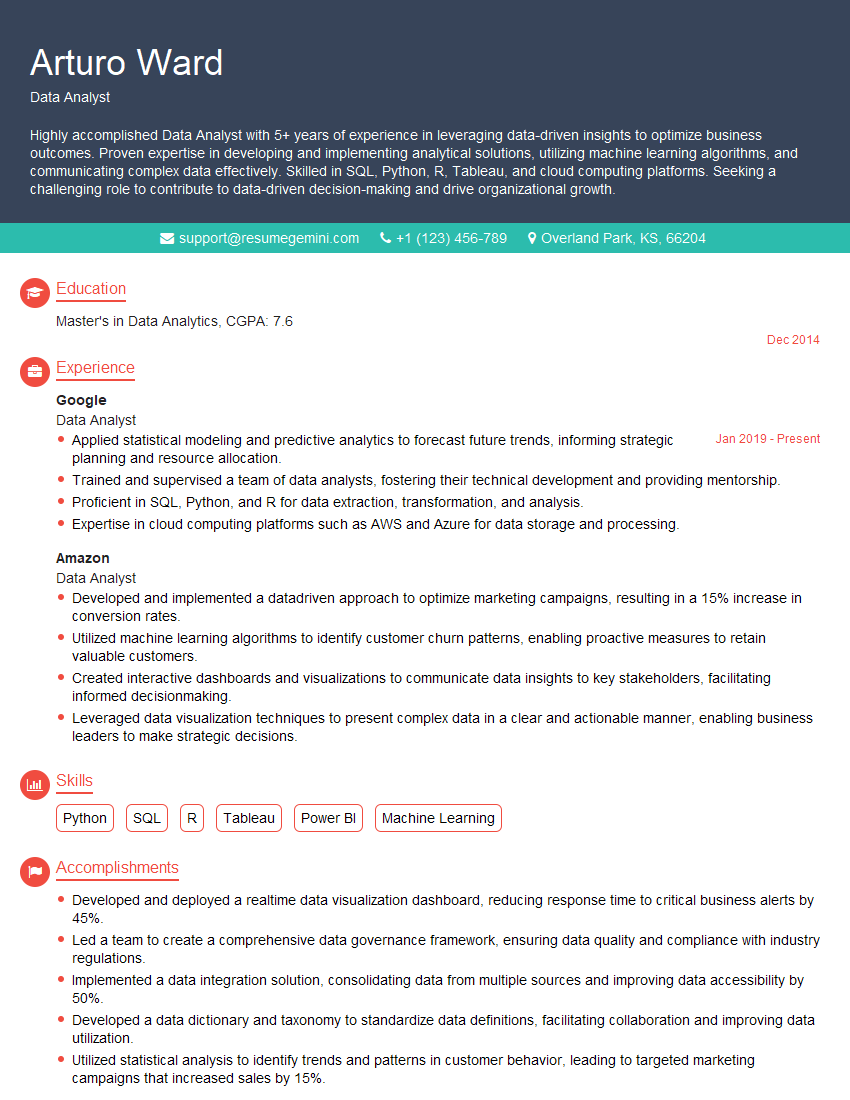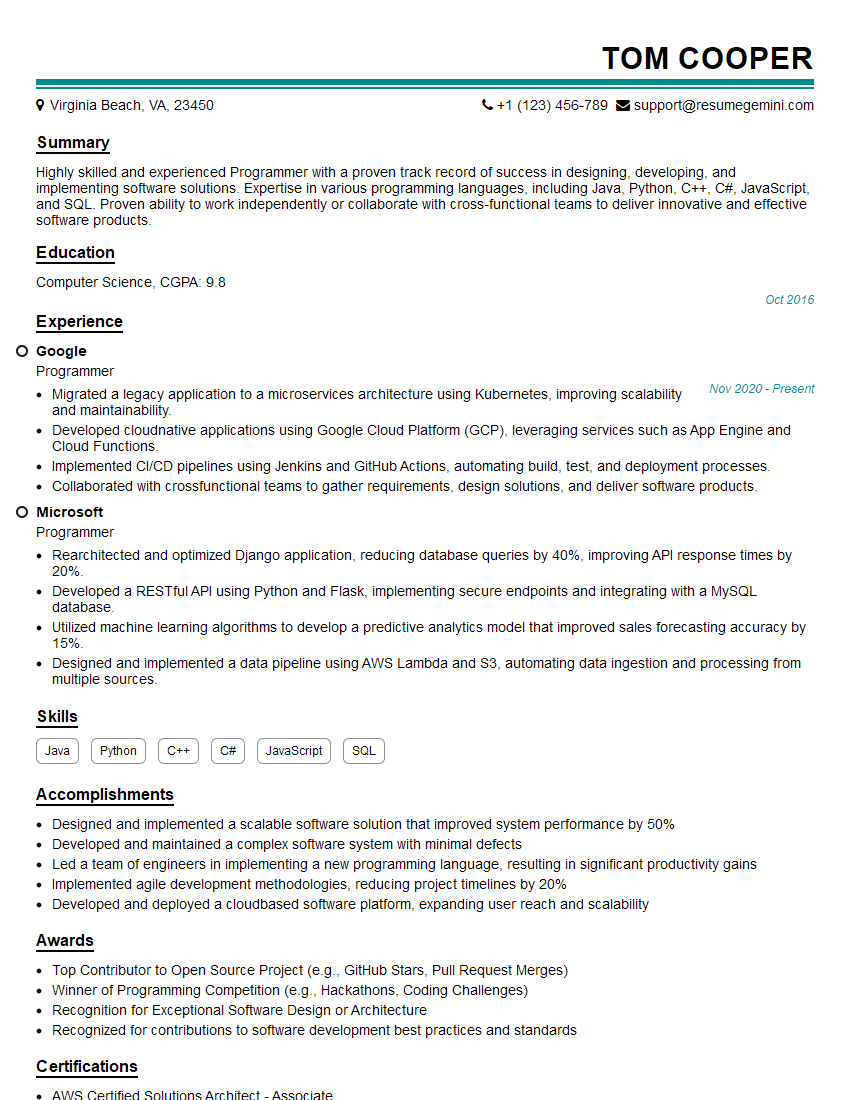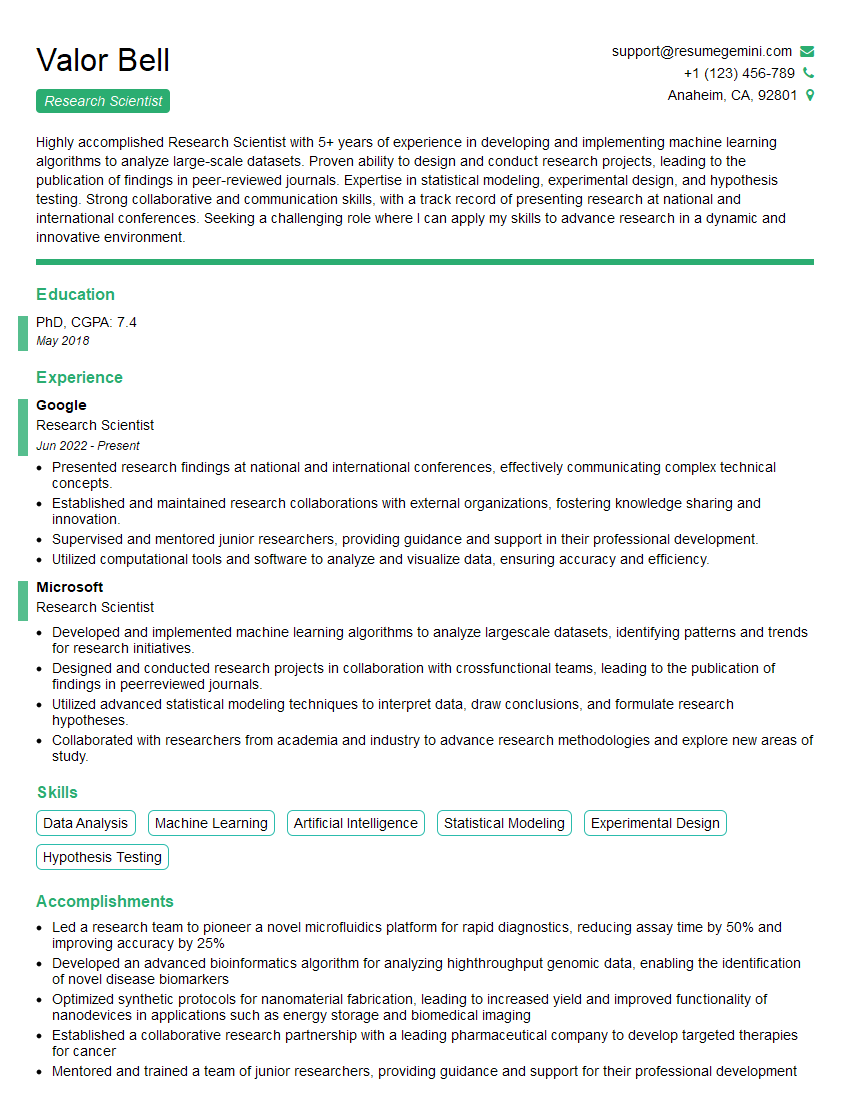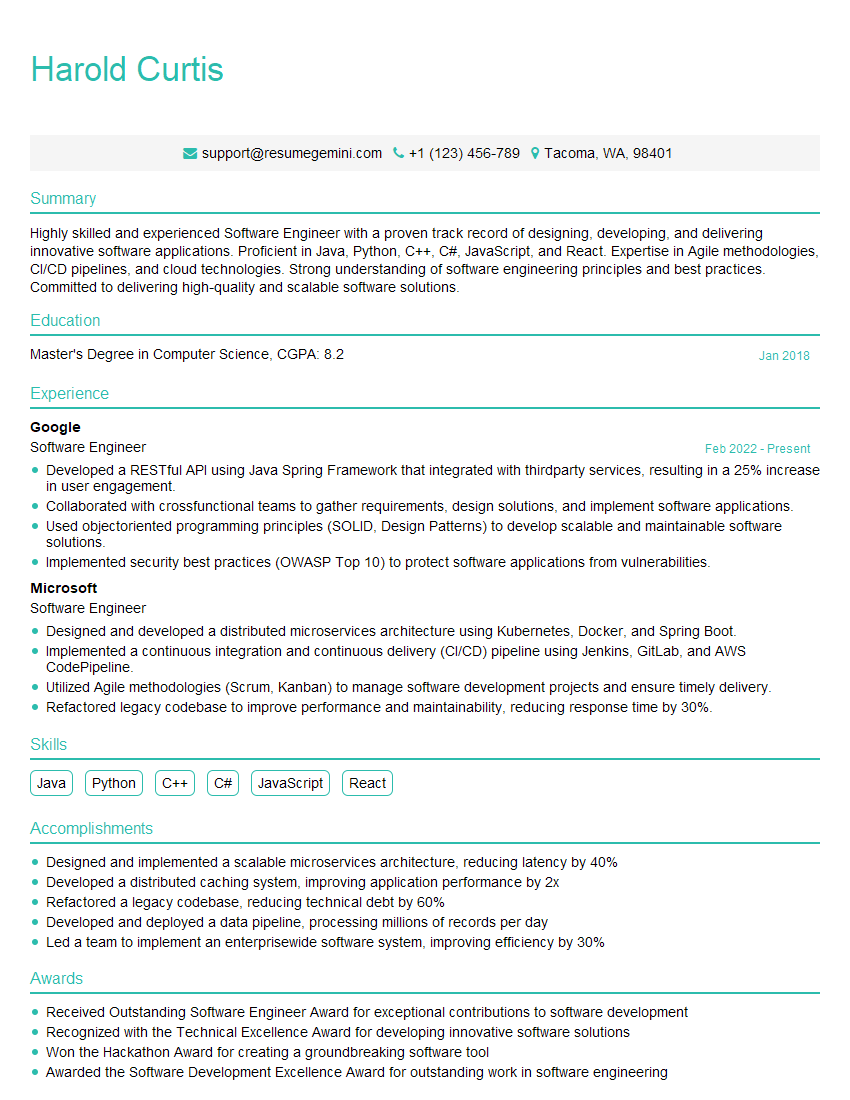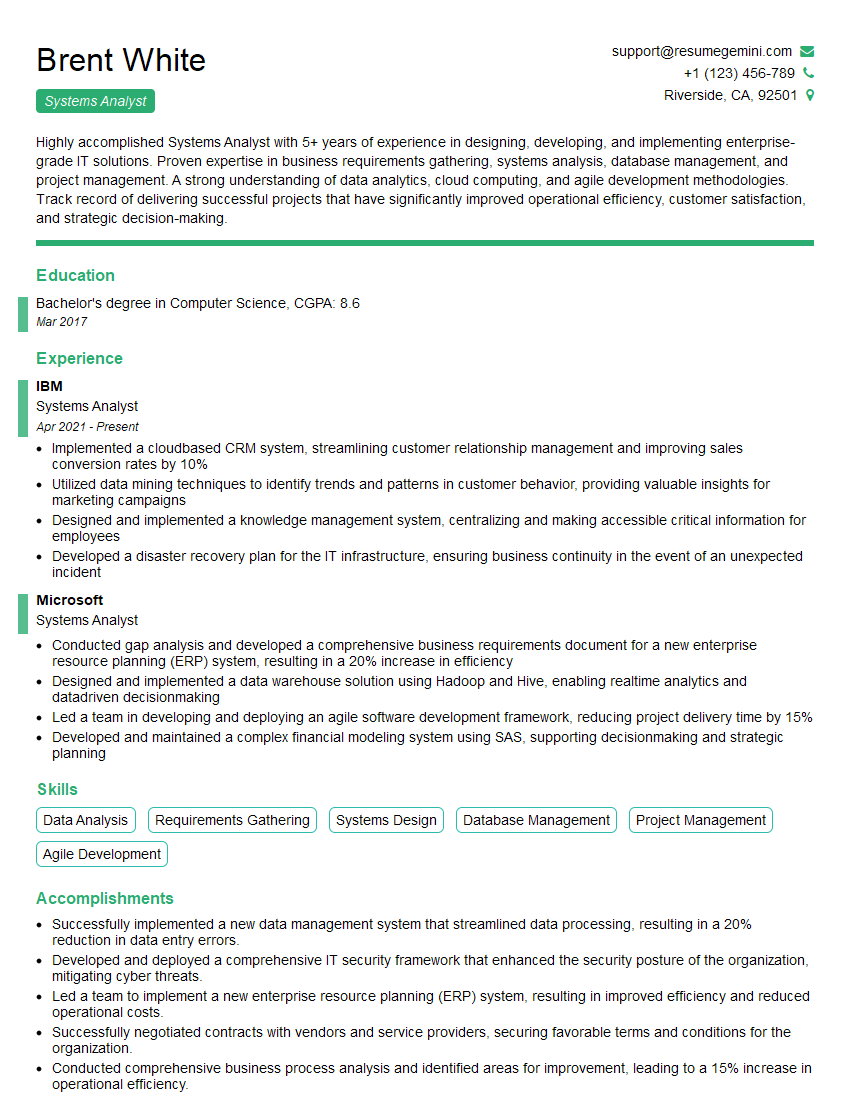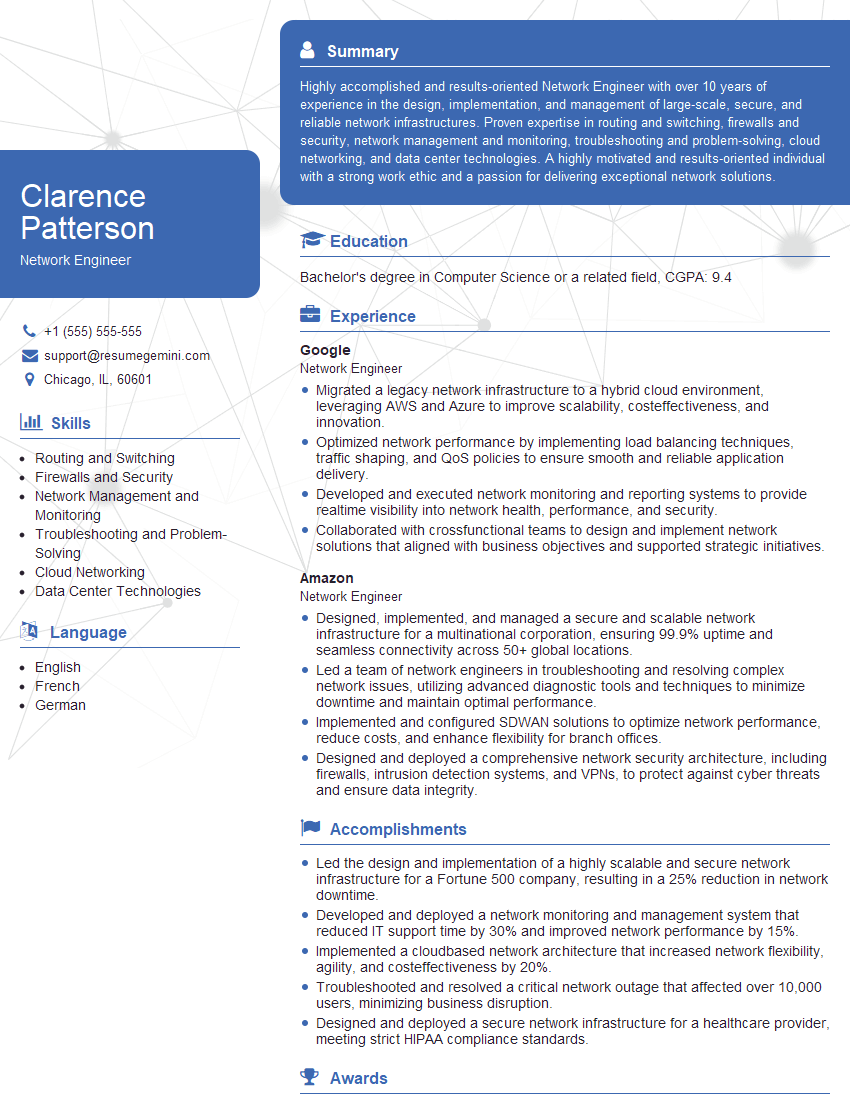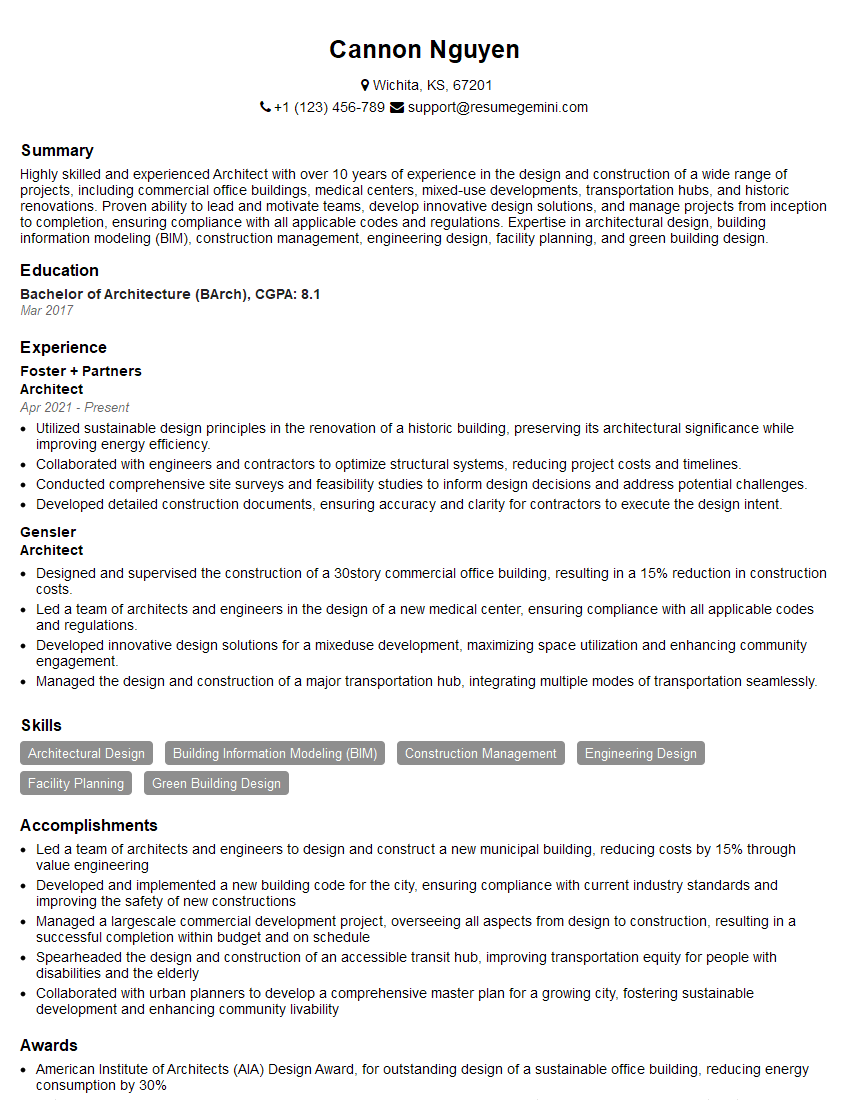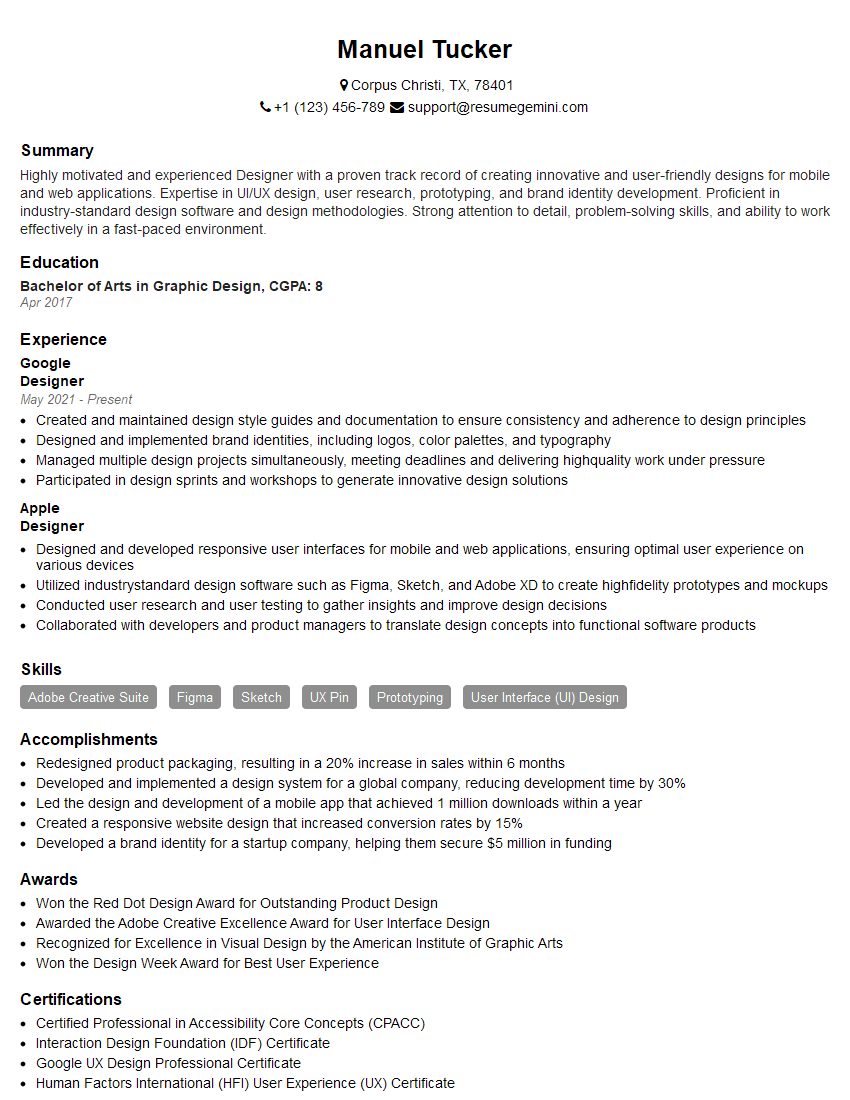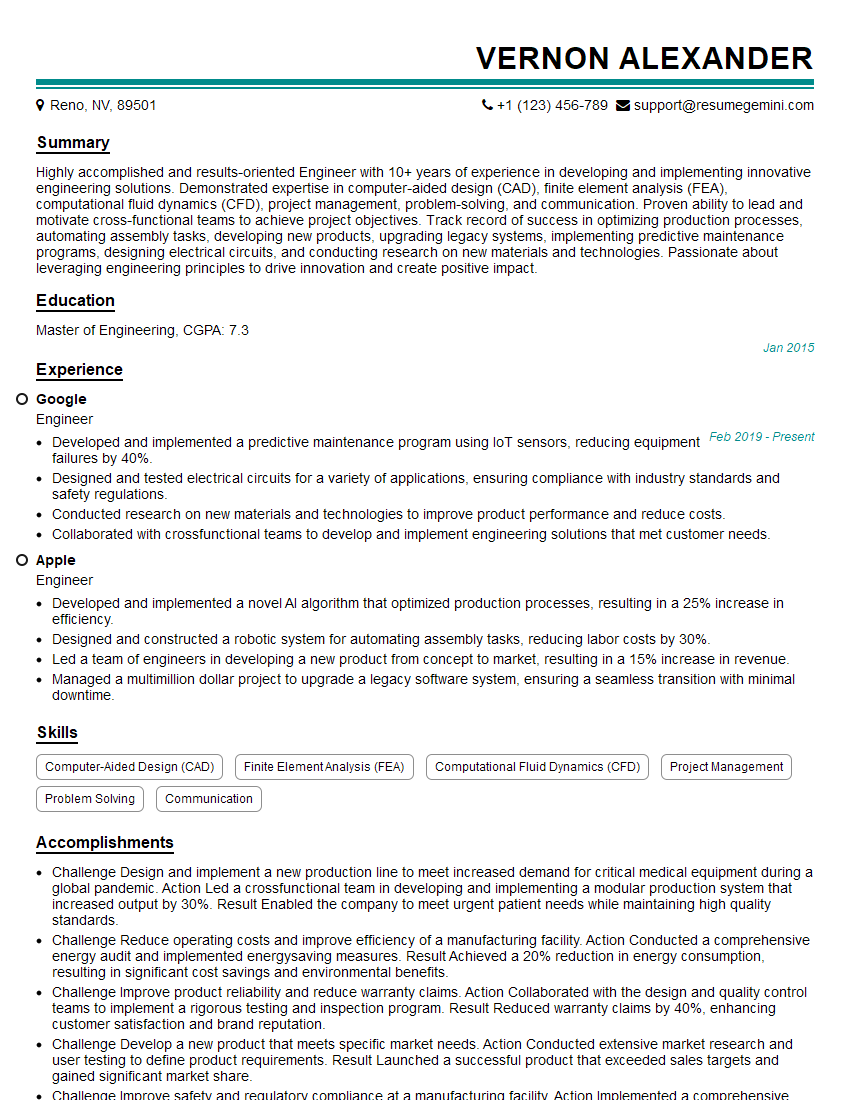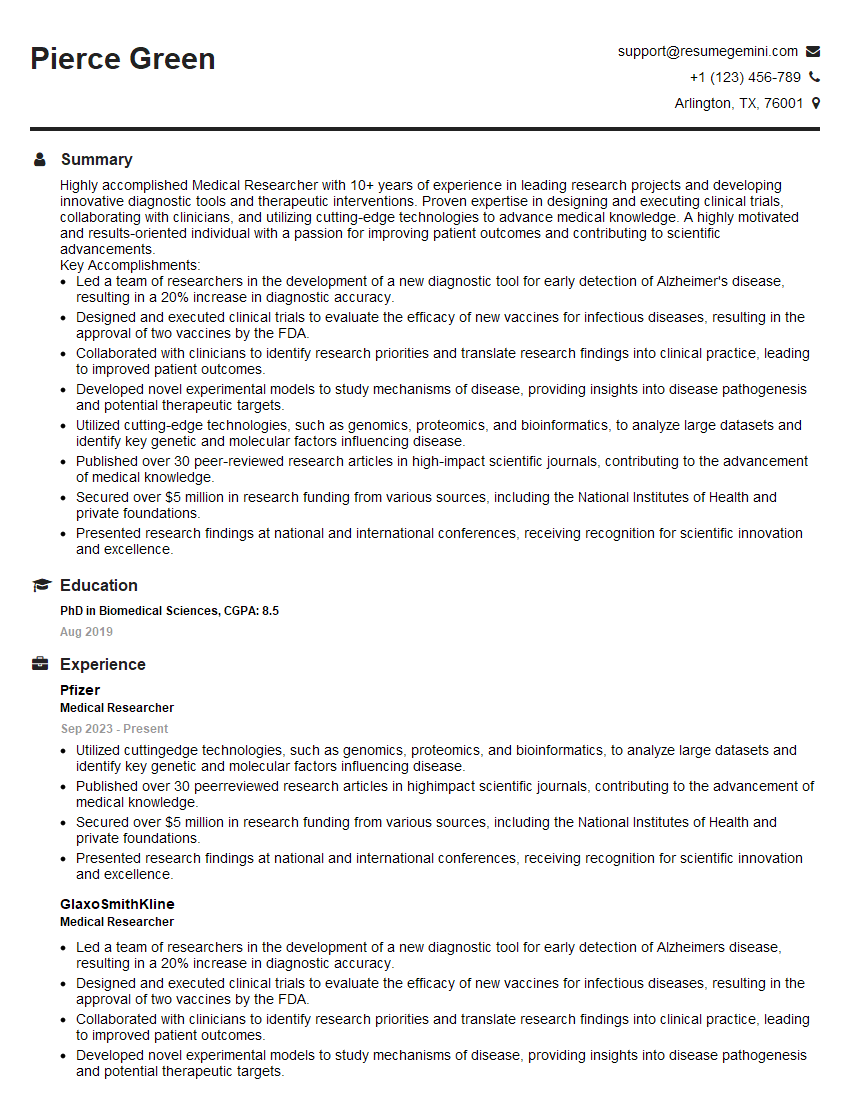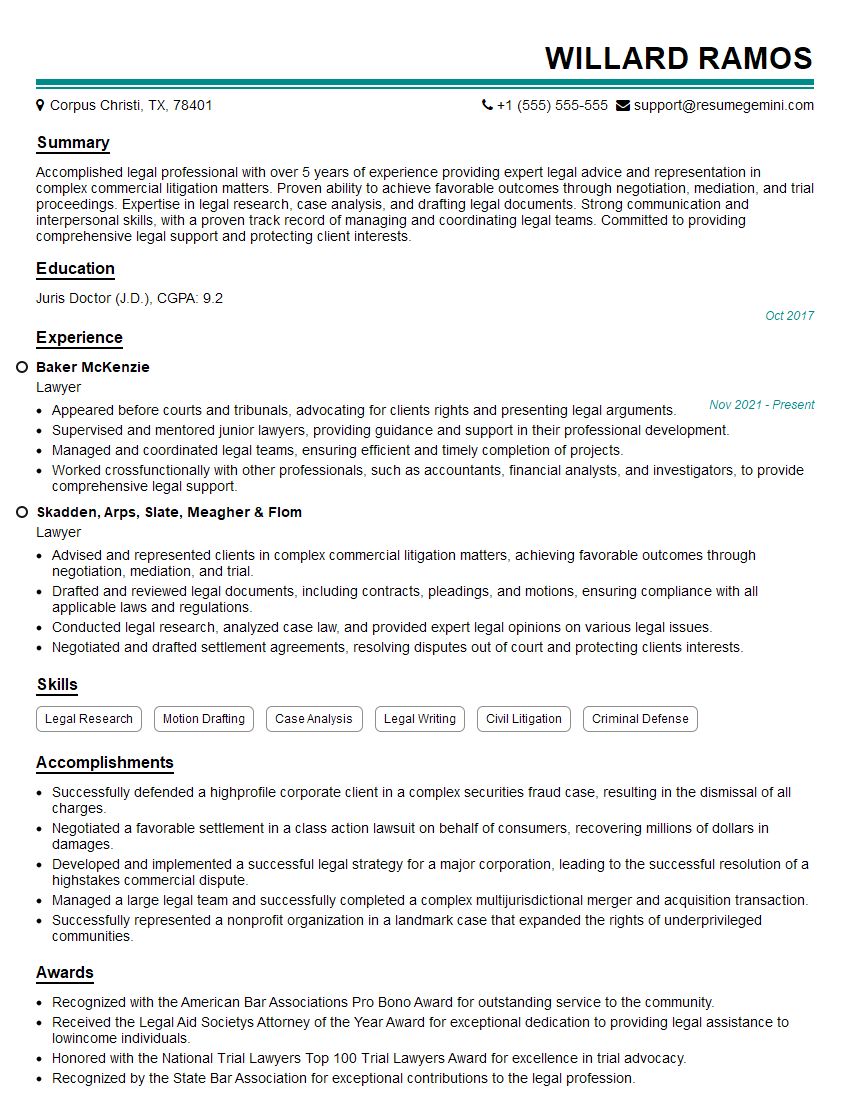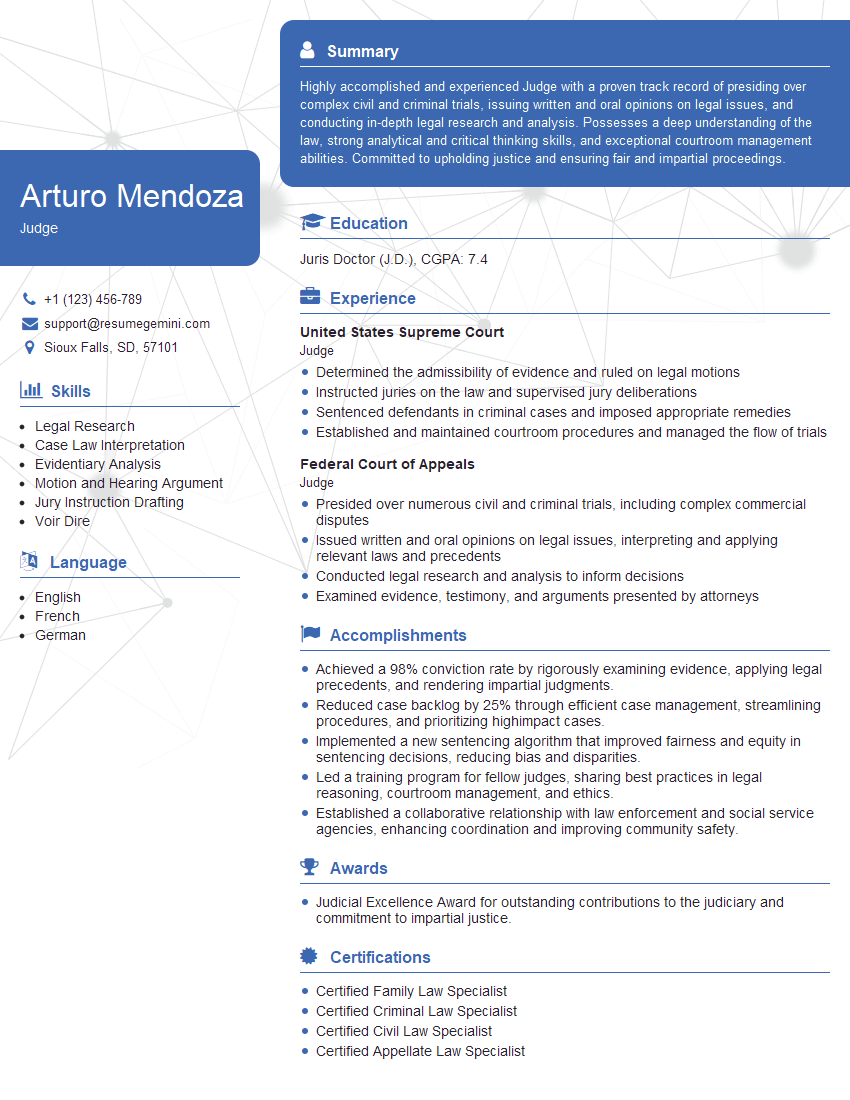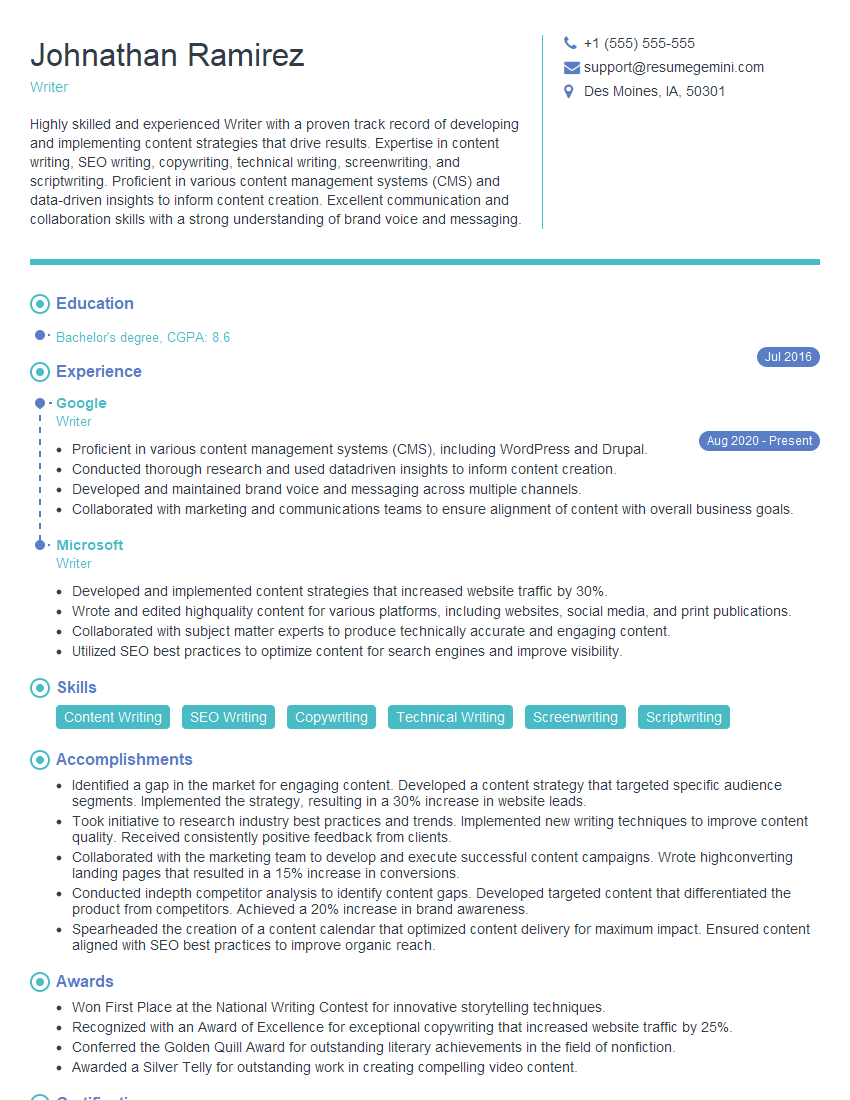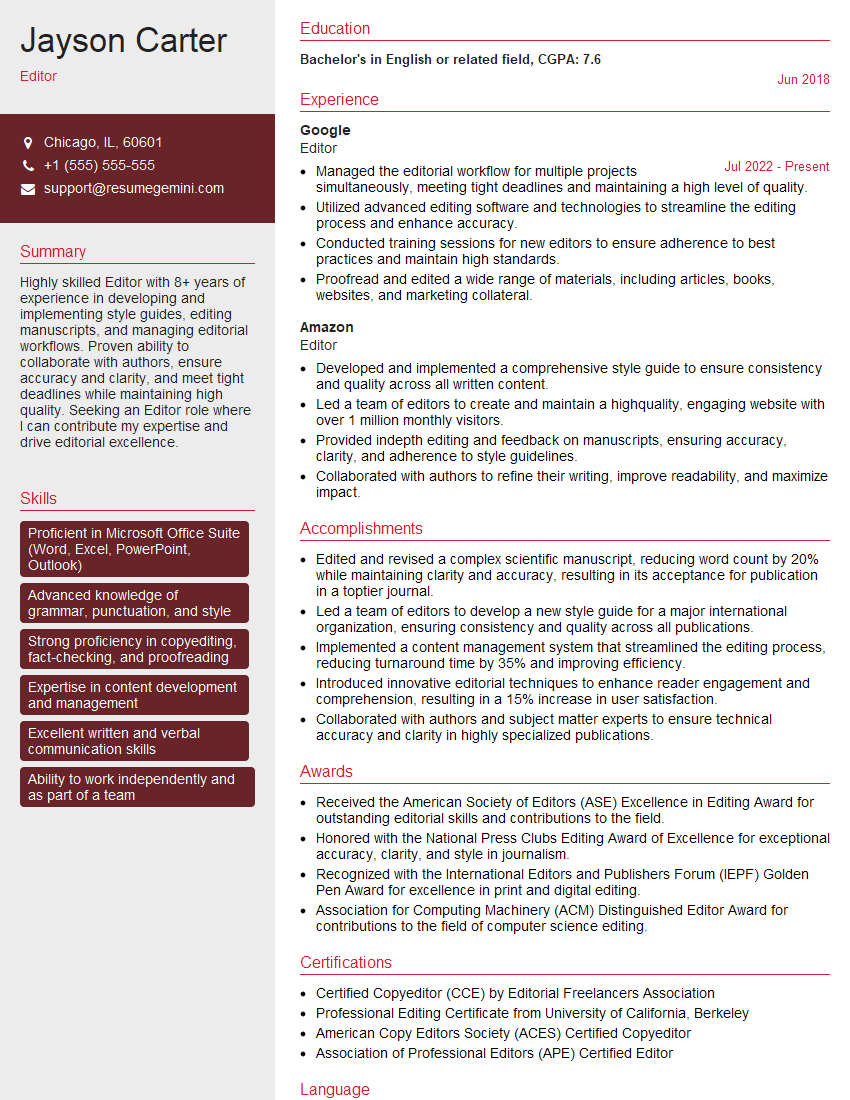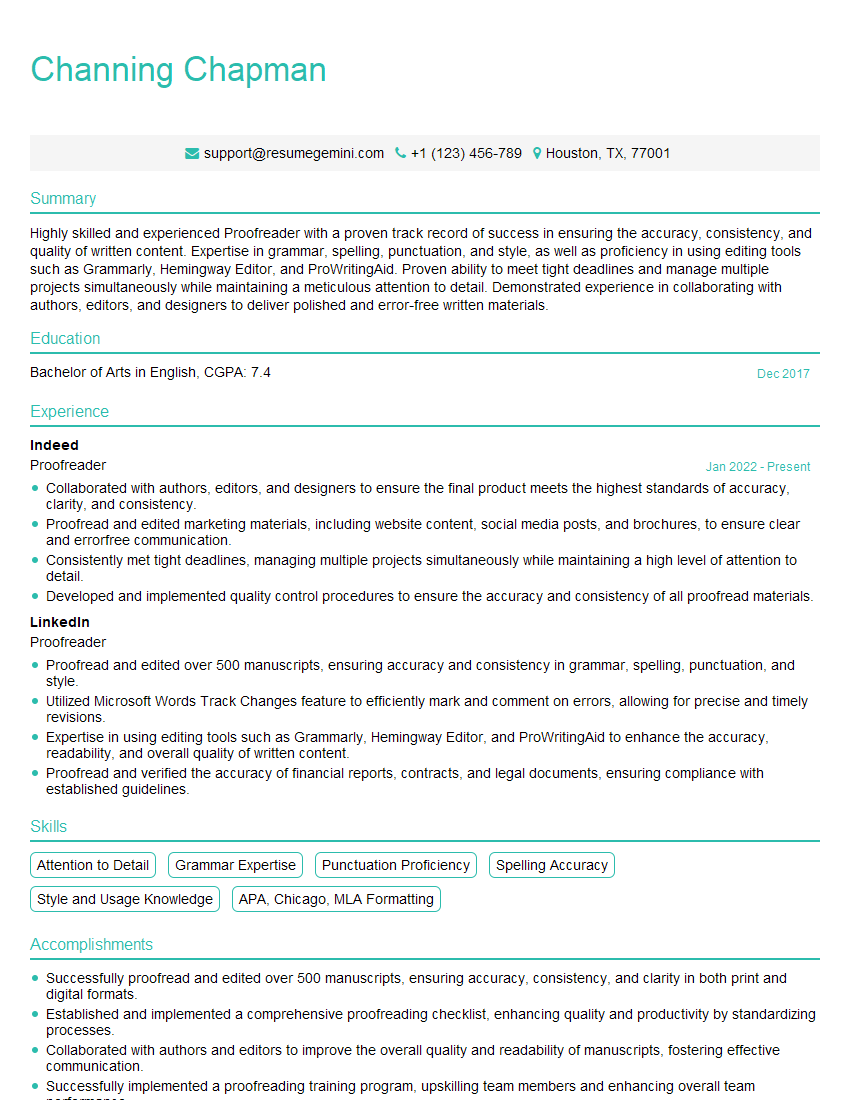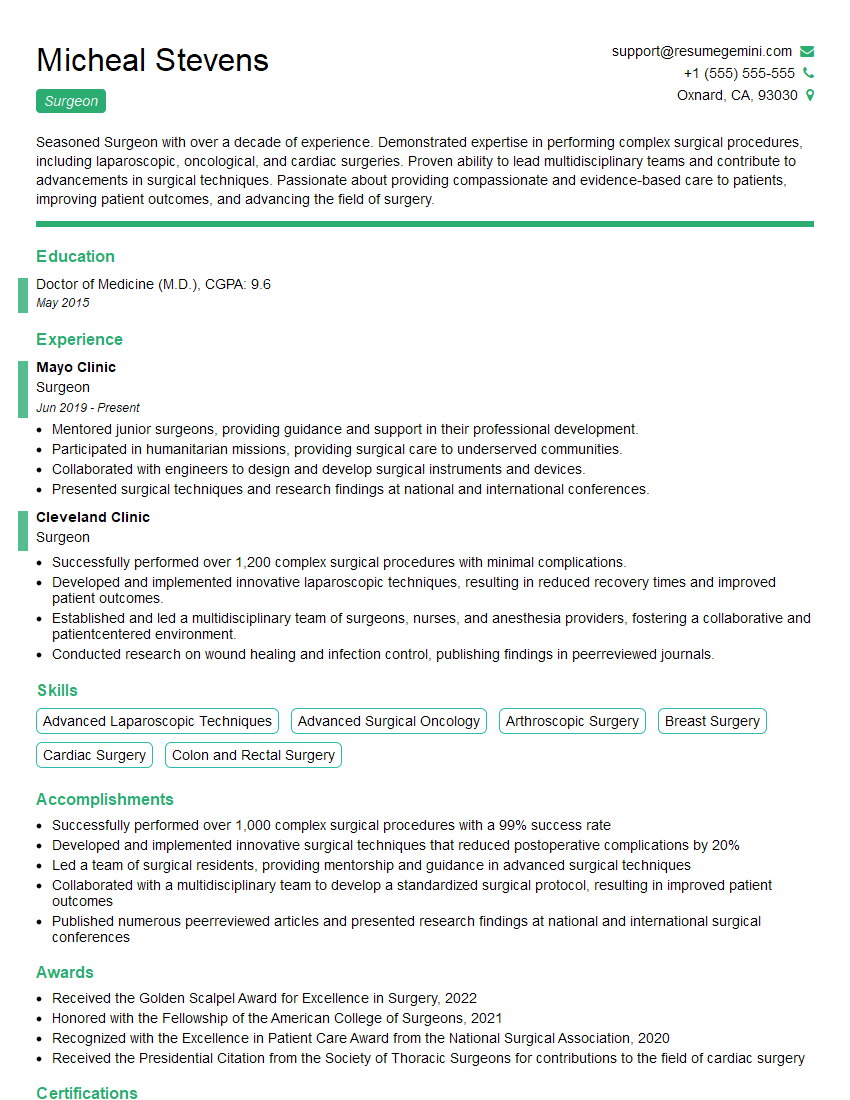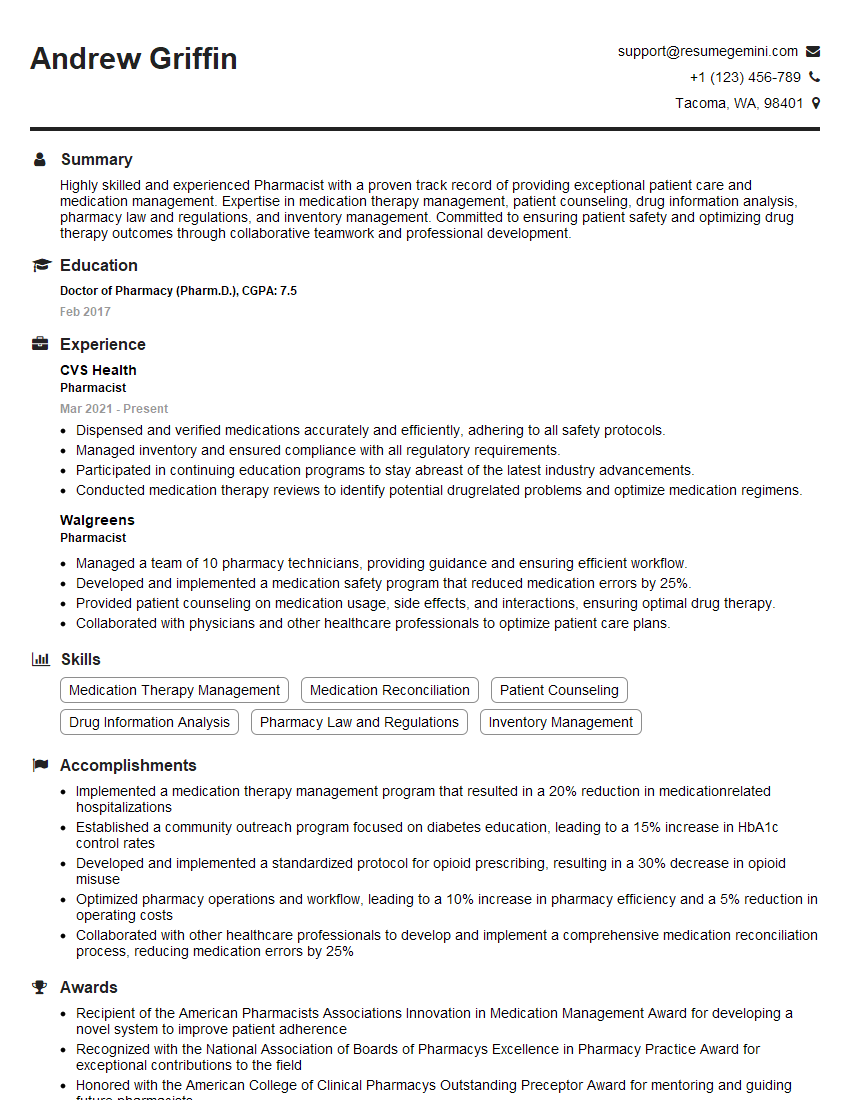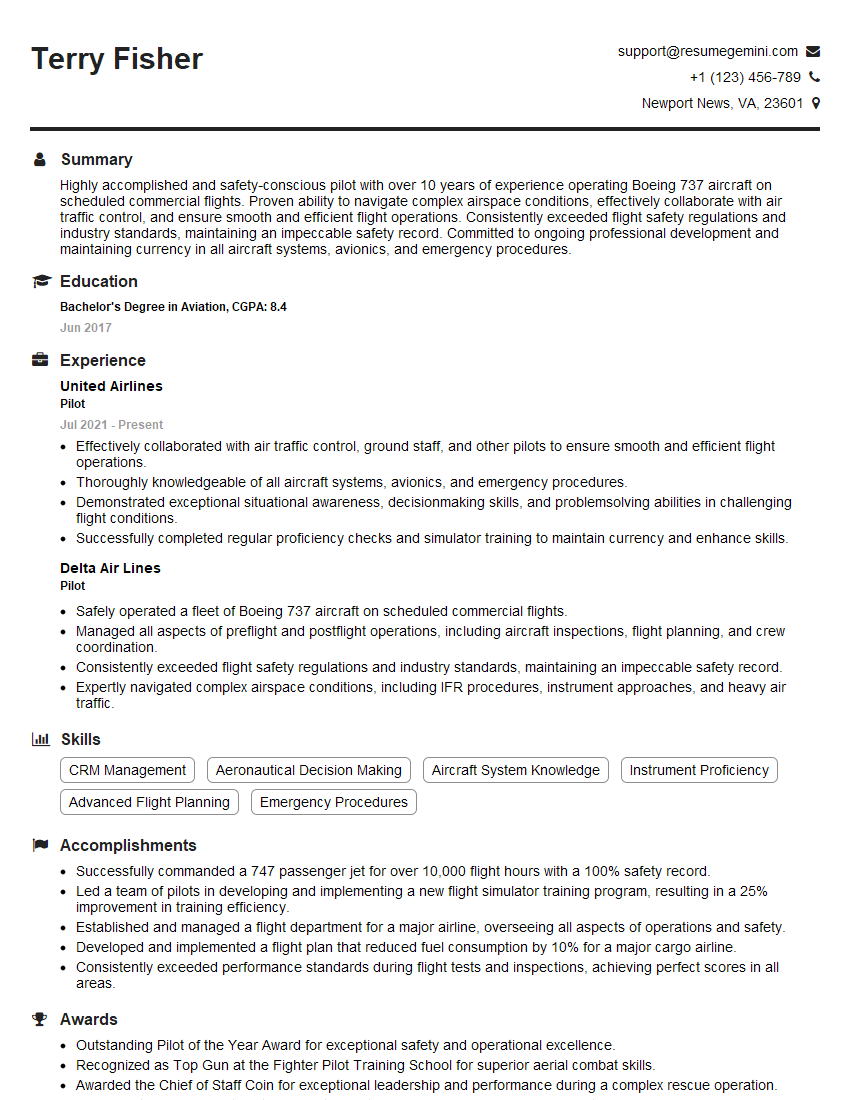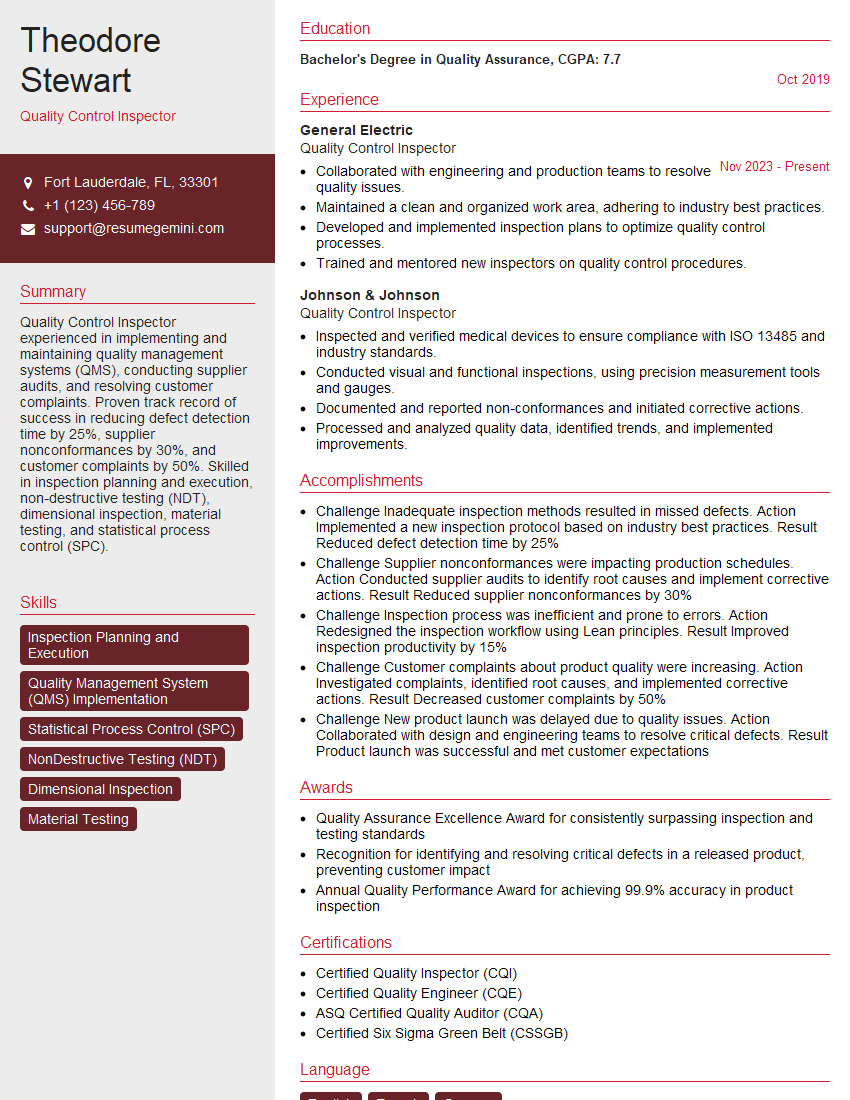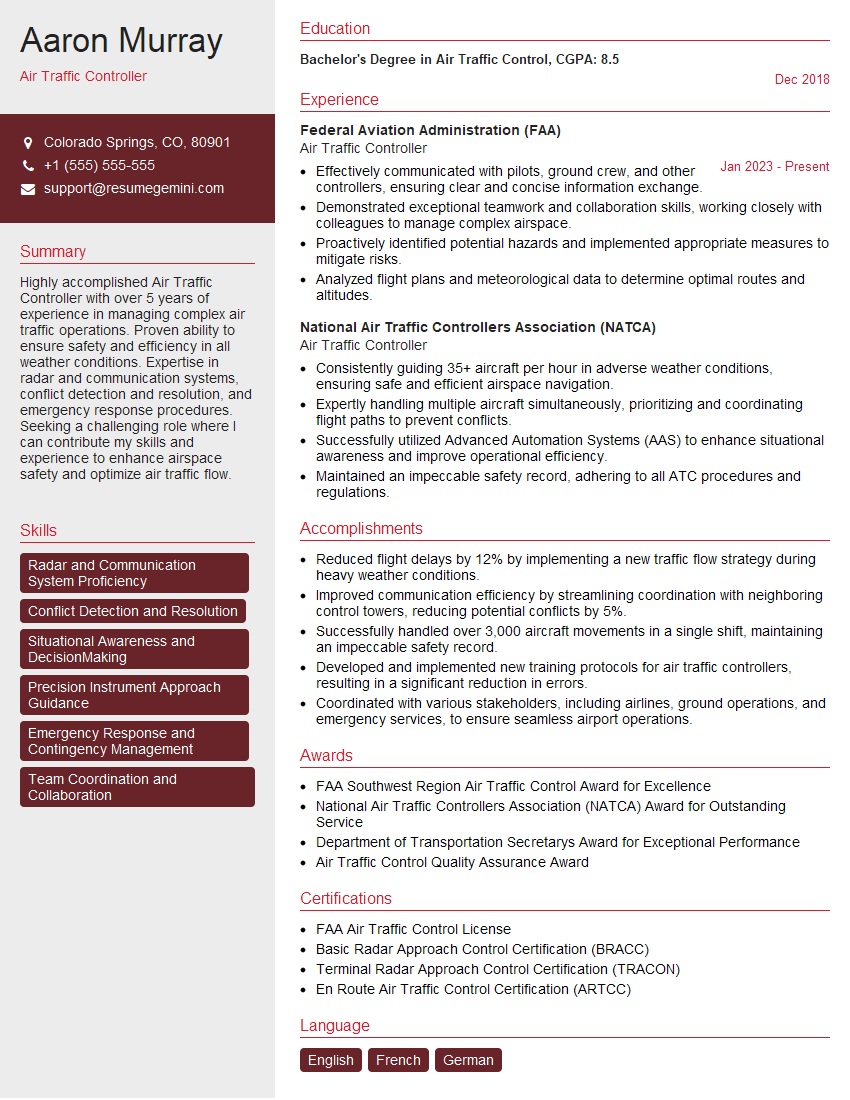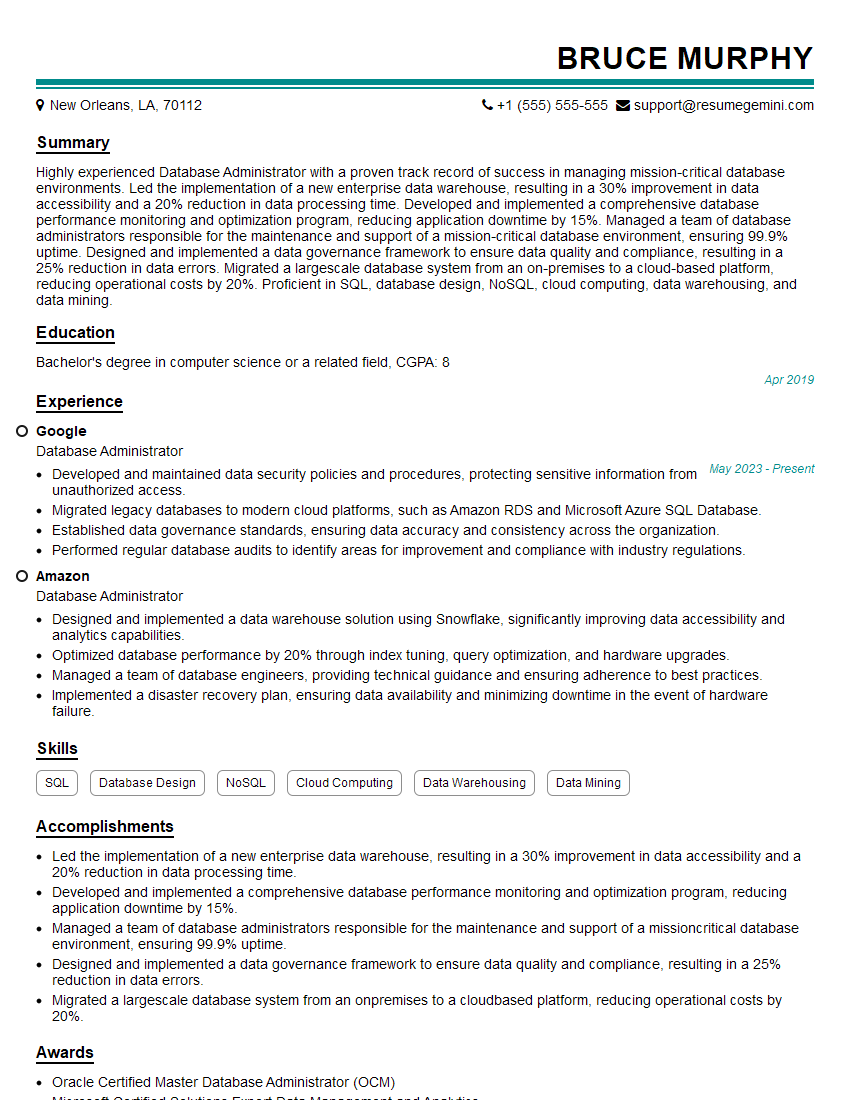Interviews are opportunities to demonstrate your expertise, and this guide is here to help you shine. Explore the essential Concentration interview questions that employers frequently ask, paired with strategies for crafting responses that set you apart from the competition.
Questions Asked in Concentration Interview
Q 1. Describe a time you had to maintain intense focus despite distractions.
Maintaining intense focus amidst distractions is a crucial skill, particularly in demanding professional environments. It requires a conscious effort to manage internal and external stimuli. For instance, during a critical project deadline, our team faced constant interruptions – emails, instant messages, and impromptu meetings. To stay focused, I employed a technique called “time blocking.” I allocated specific time slots for focused work on the most crucial tasks, silencing notifications and communicating my unavailability. This allowed me to enter a state of ‘flow,’ where distractions faded into the background. I also utilized the Pomodoro Technique, working in 25-minute intervals with short breaks in between to refresh my focus. This structured approach proved highly effective in completing the project successfully, despite the numerous distractions.
Q 2. How do you prioritize tasks to ensure optimal concentration?
Prioritizing tasks for optimal concentration involves a strategic approach that leverages both urgency and importance. I utilize the Eisenhower Matrix (urgent/important), categorizing tasks into four quadrants: Do First (urgent and important), Schedule (important but not urgent), Delegate (urgent but not important), and Eliminate (neither urgent nor important). This framework helps me focus my energy on high-impact activities, minimizing time spent on less critical items. Before beginning my workday, I review my prioritized list, setting realistic goals for the day, and ensuring I tackle the most demanding tasks during my peak concentration periods (typically mornings for me). This systematic process minimizes mental clutter and maximizes my productive time.
Q 3. What strategies do you employ to manage interruptions and maintain your focus?
Managing interruptions and maintaining focus involves proactive strategies and a mindful approach. I begin by minimizing potential distractions, such as turning off non-essential notifications and creating a dedicated workspace free from clutter. When unavoidable interruptions occur, I practice a technique of acknowledging the interruption briefly, making a note of it to address later, and then deliberately refocusing on my primary task. This prevents me from getting completely sidetracked. Communicating my availability and expectations to colleagues also helps. For example, I might schedule specific times for answering emails or attending meetings, making it clear when I need uninterrupted time for focused work. Regular short breaks, involving activities unrelated to work, are also crucial for maintaining sustained focus throughout the day.
Q 4. Explain your approach to handling complex tasks requiring sustained concentration.
Tackling complex tasks requiring sustained concentration necessitates a structured approach that breaks down the problem into smaller, manageable components. I use a process of decomposition, dividing the larger task into a series of smaller, more focused sub-tasks. This makes the overall project less daunting and allows me to achieve a sense of accomplishment as I complete each step. I also employ visual aids like flowcharts or mind maps to understand the relationships between sub-tasks and keep track of my progress. Regular self-assessment is crucial; I check my progress against my plan, adjusting my approach if necessary. Finally, celebrating milestones along the way helps maintain motivation and momentum.
Q 5. How do you identify and overcome personal obstacles to concentration?
Identifying and overcoming personal obstacles to concentration often requires self-awareness and proactive strategies. For example, if I find myself frequently distracted by personal worries, I prioritize addressing them first, either by making a plan to deal with them or setting them aside for a dedicated time. If fatigue is an issue, I ensure I get adequate sleep and take regular breaks. Sometimes, background noise can hinder my focus, so I experiment with different listening environments, using noise-canceling headphones or ambient music, depending on my preference. Regularly assessing my own work habits, identifying patterns of distraction, and experimenting with different techniques is essential for continuous improvement.
Q 6. Describe a situation where you had to maintain concentration under pressure.
Maintaining concentration under pressure is a skill honed through experience. During a critical presentation to a high-level client, I faced unexpected technical difficulties with my presentation software. While internally stressed, I consciously focused on my breathing, taking slow, deep breaths to calm my nerves. I reminded myself of the extensive preparation I had undertaken and maintained eye contact with my audience to stay present. By systematically addressing the technical issue and regaining my composure, I successfully delivered the presentation, impressing the client despite the initial setbacks. This experience reinforced the importance of remaining calm and employing coping mechanisms in high-pressure situations.
Q 7. How do you ensure accuracy in your work when dealing with high volumes of information?
Ensuring accuracy when handling high volumes of information requires a multi-faceted approach. I prioritize using reliable data sources and verify information from multiple sources whenever possible. I employ techniques like double-checking my work, utilizing checklists, and seeking peer review to identify potential errors. I also break down the tasks into smaller, manageable chunks, focusing on accuracy within each segment. Furthermore, utilizing technology such as data validation tools and error-checking software can significantly improve the accuracy of my work and reduce the likelihood of mistakes. Regular breaks also help to prevent errors caused by fatigue. By consistently applying these methods, I strive for precision and minimize the risk of inaccuracies.
Q 8. What techniques do you use to improve your attention span?
Improving attention span is a multifaceted process requiring a combination of techniques tailored to individual needs. I employ a strategic approach combining mindfulness practices, environmental control, and cognitive training.
Mindfulness Meditation: Regular meditation, even for 10-15 minutes daily, significantly enhances my ability to focus by training my brain to resist distractions and stay present. It’s like strengthening a muscle; the more you practice, the stronger your focus becomes.
Time Blocking & Pomodoro Technique: I break down tasks into manageable chunks using the Pomodoro Technique (25 minutes of focused work followed by a 5-minute break). This prevents mental fatigue and maintains consistent concentration throughout the day. Time blocking helps schedule these focused work sessions strategically.
Cognitive Training Apps: I use brain training apps that challenge my working memory and cognitive flexibility. These apps provide engaging exercises to improve focus and attention skills. It’s like exercising different parts of your brain to improve their overall performance.
Q 9. How do you stay focused on long-term goals while managing immediate tasks?
Balancing long-term goals with immediate tasks requires a structured approach that incorporates goal setting, prioritization, and regular review. I use a system of breaking down large goals into smaller, actionable steps.
SMART Goals: I ensure my long-term goals are SMART – Specific, Measurable, Achievable, Relevant, and Time-bound. This helps create a clear roadmap and prevents feeling overwhelmed.
Prioritization Matrix: I utilize an Eisenhower Matrix (urgent/important) to prioritize tasks. This allows me to focus on high-impact tasks aligned with long-term goals while effectively managing urgent matters. It helps to avoid getting bogged down in less important tasks.
Regular Review & Adjustment: I schedule regular reviews (weekly or bi-weekly) to assess progress toward long-term goals and adjust my strategies accordingly. This ensures I stay on track and make necessary course corrections.
Q 10. How do you handle multitasking and maintain concentration on each task?
Multitasking is a myth; true focus involves concentrating on one task at a time. While it might seem efficient to juggle multiple tasks, it actually reduces productivity and increases error rates. I avoid multitasking and instead prioritize single-tasking.
Task Switching Strategy: When faced with multiple tasks, I create a prioritized list and work through them one at a time. I complete one task before moving to the next, ensuring full concentration on each.
Time Blocking for Multiple Tasks: I allocate specific time blocks for different tasks, eliminating the temptation to switch between them prematurely. This helps maintain focus and minimizes context switching overhead.
Batching Similar Tasks: I group similar tasks together (e.g., answering emails, making phone calls) to minimize mental switching costs and improve efficiency. This creates a flow state and optimizes concentration.
Q 11. Describe your approach to detail-oriented work requiring high levels of concentration.
Detail-oriented work demands meticulous attention and a systematic approach. My strategy combines careful planning, methodical execution, and rigorous review.
Thorough Preparation: Before starting, I carefully review all instructions and materials to ensure a complete understanding of the task’s requirements. This avoids errors and wasted time.
Structured Approach: I follow a structured workflow, breaking down complex tasks into smaller, manageable steps. This allows for focused attention on each individual component.
Regular Checks & Verification: Throughout the process, I conduct regular checks and verifications to ensure accuracy and identify potential errors early on. This helps to maintain high levels of precision.
Proofreading & Review: After completion, I dedicate time to thorough proofreading and review, using checklists or other verification methods to minimize the chance of overlooking details. This is crucial for ensuring high quality output.
Q 12. How do you manage fatigue or stress that impacts your concentration?
Fatigue and stress are significant obstacles to concentration. Addressing them proactively is crucial for maintaining focus. My approach involves a combination of lifestyle adjustments and coping mechanisms.
Adequate Sleep: Prioritizing 7-8 hours of quality sleep is fundamental. Sufficient sleep significantly improves cognitive function and concentration.
Regular Exercise: Physical activity reduces stress and improves focus. Even a short walk or quick workout can significantly boost concentration.
Mindfulness & Relaxation Techniques: Deep breathing exercises, mindfulness meditation, or short breaks for relaxation help alleviate stress and improve focus. These techniques help to reset your mind and improve concentration.
Healthy Diet: A balanced diet provides the necessary nutrients for optimal brain function. Avoiding excessive caffeine or sugar helps maintain stable energy levels and concentration.
Q 13. Have you ever experienced difficulty concentrating? How did you address it?
Yes, I have experienced periods of difficulty concentrating, particularly during times of high stress or burnout. When this happened, I addressed the root cause rather than just the symptom.
Identifying the Underlying Cause: I took time to identify the factors contributing to the lack of concentration (stress, sleep deprivation, poor diet, etc.). Understanding the cause is the first step toward effective problem-solving.
Seeking Support: If the issue persisted, I sought support from colleagues, mentors, or even professionals to address underlying mental health concerns. Don’t hesitate to seek help when needed.
Implementing Self-Care Strategies: I prioritized self-care activities, such as spending time in nature, pursuing hobbies, and engaging in activities I enjoy. These helped to alleviate stress and improve overall well-being, which in turn, improved my concentration.
Q 14. What methods do you use to minimize distractions while working?
Minimizing distractions is essential for maintaining concentration. My approach involves both environmental and behavioral strategies.
Dedicated Workspace: I have a dedicated workspace free from clutter and distractions. A tidy and organized space promotes focus.
Noise Cancellation: I use noise-canceling headphones or ambient noise to block out distracting sounds. This creates a more focused environment.
Digital Detox: I minimize digital distractions by turning off notifications, closing unnecessary tabs, and using website blockers when needed. This significantly improves concentration.
Communication Management: I communicate my need for focused time to colleagues and family, setting boundaries to avoid interruptions. Clear communication helps to manage expectations and reduces distractions.
Q 15. How do you assess your own concentration level and identify areas for improvement?
Assessing my concentration involves a multifaceted approach. I regularly employ self-reflection, feedback mechanisms, and objective performance measures. Self-reflection involves honestly evaluating my focus during tasks. For instance, I track how often my mind wanders during meetings or complex projects. I note external distractions and internal thoughts that interrupt my concentration. Feedback comes from observing my productivity and the quality of my work. If I consistently make errors or miss deadlines, it indicates areas needing improvement. Finally, objective measures, like time spent on focused work versus time spent on distractions, offer quantitative data to assess my concentration. I use apps that track my screen time and activity, giving me a clear picture of my focus patterns. Identifying areas for improvement often reveals patterns. For example, if my concentration consistently dips in the afternoon, I might adjust my work schedule or incorporate a short break for physical activity. If I find myself easily distracted by emails, I might schedule specific times to check them rather than constantly monitoring my inbox. The key is to be self-aware, gather data, and then implement strategies tailored to my individual needs.
Career Expert Tips:
- Ace those interviews! Prepare effectively by reviewing the Top 50 Most Common Interview Questions on ResumeGemini.
- Navigate your job search with confidence! Explore a wide range of Career Tips on ResumeGemini. Learn about common challenges and recommendations to overcome them.
- Craft the perfect resume! Master the Art of Resume Writing with ResumeGemini’s guide. Showcase your unique qualifications and achievements effectively.
- Don’t miss out on holiday savings! Build your dream resume with ResumeGemini’s ATS optimized templates.
Q 16. Describe a time you had to concentrate on a difficult problem for an extended period.
During my time at [Previous Company Name], we faced a critical issue with a system outage impacting a major client. The root cause was elusive, and we had limited time to resolve it before significant financial repercussions. The problem involved sifting through complex logs, analyzing network traffic data, and coordinating with multiple teams. To maintain concentration, I employed several strategies. First, I created a detailed plan, breaking down the problem into smaller, manageable tasks. This prevented feeling overwhelmed. I allocated specific time blocks for each task, minimizing context switching. To enhance focus, I minimized distractions by silencing notifications, using noise-canceling headphones, and communicating clearly with team members to avoid unnecessary interruptions. Regular short breaks, involving physical stretching or a quick walk, were critical in maintaining sustained concentration. Ultimately, through methodical problem-solving and focused effort, we identified the cause—a faulty server component—and restored service within the critical timeframe. This experience reinforced the importance of planning, minimizing distractions, and using short breaks to maintain concentration during high-pressure situations.
Q 17. How do you handle conflicting priorities while maintaining concentration?
Handling conflicting priorities while maintaining concentration requires a structured approach. I prioritize tasks using methods like the Eisenhower Matrix (urgent/important), which helps classify tasks based on urgency and importance. This allows me to focus on what truly matters first. Time blocking is another crucial technique; I allocate specific time slots for tasks, ensuring that I dedicate focused time to each priority. This approach prevents task-switching, which significantly impacts concentration. Effective communication is also key. I proactively communicate with stakeholders about deadlines and potential delays, ensuring transparency and collaboration. This helps manage expectations and avoid unnecessary stress. Furthermore, I leverage tools like project management software to track progress, deadlines, and dependencies, ensuring a clear overview of all ongoing tasks and preventing mental overload. Ultimately, it’s about strategically managing your time, communicating effectively, and utilizing tools to maintain clarity and focus, even amidst competing demands.
Q 18. Describe your preferred work environment for optimal concentration.
My ideal work environment is quiet, well-organized, and ergonomically sound. Minimal visual clutter helps reduce distractions, promoting better focus. A comfortable chair and proper desk setup prevent physical discomfort, allowing me to concentrate for longer periods. I prefer a workspace with natural light, as it improves mood and alertness. While complete silence is ideal, I find ambient noise (like white noise or nature sounds) can be beneficial for some tasks, helping to block out disruptive sounds. Moreover, having easy access to essential tools and resources minimizes interruptions and reduces the mental overhead required to locate necessary materials. I also prioritize a workspace that promotes good posture and regular movement to prevent fatigue and maintain focus. Regular breaks are built into my schedule and utilize a different environment to refresh concentration.
Q 19. How do you ensure accuracy and precision when working under time constraints?
Ensuring accuracy and precision under time constraints necessitates a strategic approach. First, I thoroughly understand the task requirements and break it down into smaller, manageable steps. This allows me to allocate sufficient time for each step, reducing the likelihood of errors. I prioritize the most critical aspects, ensuring that the core elements are completed accurately even if less time remains for secondary aspects. Using checklists and templates helps maintain consistency and avoid overlooking important details. I also employ techniques like double-checking my work, especially on critical sections, to catch potential errors. Additionally, taking short, focused breaks helps prevent mental fatigue, reducing the probability of mistakes. Finally, I practice mindfulness and maintain a calm demeanor to prevent rushing and careless errors, ensuring my work is both precise and accurate within the allocated time frame.
Q 20. What role does mindfulness play in your ability to concentrate?
Mindfulness plays a significant role in enhancing my concentration. Mindfulness practices, such as meditation or deep breathing exercises, help calm the mind and reduce mental clutter. This, in turn, improves my ability to focus on the task at hand and resist distractions. By regularly practicing mindfulness, I become more aware of my thoughts and emotions, allowing me to recognize and manage distractions more effectively. For example, when I notice my mind wandering, mindfulness techniques enable me to gently redirect my focus back to the task. This heightened self-awareness prevents prolonged periods of distraction, promoting sustained concentration and improved productivity. The ability to observe my thoughts and feelings without judgment is crucial in managing mental distractions, enabling a more focused state of mind.
Q 21. How do you balance work and personal life to maintain your concentration levels?
Balancing work and personal life is vital for maintaining optimal concentration levels. I use time management techniques, such as time blocking and prioritization, to allocate specific time for both work and personal activities. Setting clear boundaries between work and personal life is crucial. This means designating specific times for work and strictly adhering to them, minimizing work-related intrusions during personal time. I also incorporate regular breaks and engage in activities that promote relaxation and rejuvenation, such as exercise, spending time in nature, or pursuing hobbies. This helps prevent burnout and mental fatigue, which can significantly impact concentration. Adequate sleep and a healthy diet are also essential for maintaining energy levels and mental clarity. By creating a well-structured schedule and prioritizing self-care, I ensure that both my professional and personal life contribute to sustained focus and well-being.
Q 22. How do you stay motivated and focused on long-term projects?
Maintaining focus on long-term projects requires a multifaceted approach. It’s not just about willpower; it’s about strategic planning and consistent self-management. I find that breaking down large projects into smaller, manageable tasks is crucial. This creates a sense of accomplishment with each completed step, fueling motivation. Think of it like climbing a mountain – you wouldn’t attempt the summit in one go. You’d break the journey into smaller, achievable segments.
Secondly, I utilize time-blocking techniques. Scheduling specific times for focused work on the project helps create structure and prevents procrastination. For example, I might dedicate two hours every morning to a particular project phase. Finally, regular reflection is key. I periodically review my progress, adjusting my strategy as needed. This helps maintain momentum and prevents feeling overwhelmed. This involves celebrating milestones, no matter how small, to reinforce positive reinforcement and keep motivation high.
Q 23. What are your strategies for staying organized to support your concentration?
Organization is the bedrock of effective concentration. My strategies revolve around digital and physical organization systems. Digitally, I use project management tools like Asana or Trello to visually track tasks, deadlines, and progress. This provides a clear overview and allows me to prioritize effectively. Physically, I maintain a clean and organized workspace. A clutter-free environment minimizes visual distractions and promotes a sense of calm, conducive to focused work. I also utilize note-taking systems, ensuring I capture all important information in one place. This reduces mental clutter, freeing up cognitive resources for concentration.
Q 24. How do you handle unexpected interruptions that disrupt your workflow?
Unexpected interruptions are inevitable. My approach centers on managing them efficiently without losing the flow of my work. I use the ‘Pomodoro Technique,’ working in focused bursts (e.g., 25 minutes) followed by short breaks. This allows me to quickly regain my focus after an interruption. If an interruption requires immediate attention, I briefly acknowledge it, jot down any necessary information to address it later, and then consciously return to my task. The key is to minimize the time spent dealing with the interruption and to efficiently re-engage with the main task at hand. For example, if a colleague needs my help, I might offer a brief 5-minute solution while keeping my current work context visible on my screen for easy return.
Q 25. How do you proactively prevent distractions and maintain concentration?
Proactive distraction prevention is crucial. I begin by identifying my common distractions – whether it’s email notifications, social media, or noisy colleagues. I then implement strategies to minimize them. This involves turning off non-essential notifications, using website blockers during focused work sessions, and communicating my need for uninterrupted time to colleagues. I also create a dedicated workspace, free from distractions, where I can focus solely on the task at hand. The goal is to create a ‘concentration sanctuary,’ making my environment conducive to focused work and reducing the temptation to get sidetracked.
Q 26. Describe your experience working independently on tasks requiring high concentration.
I have extensive experience working independently on complex tasks requiring intense concentration. For example, during my previous role, I was responsible for developing a comprehensive data analysis model. This involved weeks of solitary work, requiring meticulous attention to detail and sustained focus. I successfully completed the project on time and within budget, demonstrating my ability to manage and execute independently demanding concentration tasks. I found that self-discipline, coupled with effective time management and regular breaks, were essential in successfully completing this project. It proved to be a significant achievement.
Q 27. How do you adapt your concentration techniques to different work settings and tasks?
Adapting concentration techniques to different settings and tasks is essential. In collaborative settings, I communicate my need for focused periods and actively participate in setting boundaries. In noisy environments, I might use noise-canceling headphones or find a quieter workspace. For tasks requiring creativity, I may incorporate short walks or mindfulness exercises to stimulate different thought processes. For highly analytical tasks, I prefer a structured, quiet environment. The key is understanding which techniques best serve the task at hand and adjusting accordingly. Context matters!
Q 28. How do you measure your success in maintaining concentration and focus?
I measure my success in maintaining concentration through several key indicators. Firstly, I track the completion of tasks within allocated timeframes. Consistently meeting deadlines demonstrates effective time management and focus. Secondly, I review the quality of my work. Are there mistakes due to lack of attention to detail? High-quality output indicates sustained concentration. Finally, I reflect on my own self-assessment; How focused did I feel throughout the day? If I find my focus slipping frequently, it signals the need to refine my strategies and address potential contributing factors. This holistic approach provides a comprehensive view of my concentration levels and success.
Key Topics to Learn for Concentration Interview
- Fundamentals of Attention: Understanding the cognitive processes involved in selective attention, sustained attention, and divided attention. This includes exploring relevant neurological pathways and limitations.
- Practical Application: Analyze case studies illustrating how attentional deficits impact performance in various fields (e.g., aviation, surgery, driving). Consider the design of tools and environments to optimize concentration.
- Attentional Training Techniques: Explore various methods for improving concentration, such as mindfulness, meditation, and cognitive training exercises. Discuss the effectiveness and limitations of each approach.
- Cognitive Load Theory: Understand how information processing capacity influences attention and performance. Learn how to manage cognitive load to enhance concentration.
- Interference and Distraction: Explore the different types of interference (e.g., internal, external) and strategies for minimizing distractions to optimize concentration.
- Assessment and Measurement: Familiarize yourself with different methods used to assess and measure attention and concentration (e.g., psychometric tests, behavioral observations).
- Neurobiological Correlates: Understand the neural mechanisms underlying attention and concentration, including the roles of specific brain regions and neurotransmitters.
Next Steps
Mastering the principles of concentration is crucial for success in many demanding roles, boosting your ability to manage complex tasks, solve problems efficiently, and make sound decisions under pressure. This translates to increased productivity and career advancement opportunities. To significantly improve your job prospects, it’s vital to create a resume that Applicant Tracking Systems (ATS) can easily read. ResumeGemini is a trusted resource to help you build a professional and ATS-friendly resume that highlights your skills and experience effectively. We provide examples of resumes tailored to Concentration to help you get started. Invest time in crafting a compelling resume – it’s your first impression!
Explore more articles
Users Rating of Our Blogs
Share Your Experience
We value your feedback! Please rate our content and share your thoughts (optional).
What Readers Say About Our Blog
Hi I am a troller at The aquatic interview center and I suddenly went so fast in Roblox and it was gone when I reset.
Hi,
Business owners spend hours every week worrying about their website—or avoiding it because it feels overwhelming.
We’d like to take that off your plate:
$69/month. Everything handled.
Our team will:
Design a custom website—or completely overhaul your current one
Take care of hosting as an option
Handle edits and improvements—up to 60 minutes of work included every month
No setup fees, no annual commitments. Just a site that makes a strong first impression.
Find out if it’s right for you:
https://websolutionsgenius.com/awardwinningwebsites
Hello,
we currently offer a complimentary backlink and URL indexing test for search engine optimization professionals.
You can get complimentary indexing credits to test how link discovery works in practice.
No credit card is required and there is no recurring fee.
You can find details here:
https://wikipedia-backlinks.com/indexing/
Regards
NICE RESPONSE TO Q & A
hi
The aim of this message is regarding an unclaimed deposit of a deceased nationale that bears the same name as you. You are not relate to him as there are millions of people answering the names across around the world. But i will use my position to influence the release of the deposit to you for our mutual benefit.
Respond for full details and how to claim the deposit. This is 100% risk free. Send hello to my email id: [email protected]
Luka Chachibaialuka
Hey interviewgemini.com, just wanted to follow up on my last email.
We just launched Call the Monster, an parenting app that lets you summon friendly ‘monsters’ kids actually listen to.
We’re also running a giveaway for everyone who downloads the app. Since it’s brand new, there aren’t many users yet, which means you’ve got a much better chance of winning some great prizes.
You can check it out here: https://bit.ly/callamonsterapp
Or follow us on Instagram: https://www.instagram.com/callamonsterapp
Thanks,
Ryan
CEO – Call the Monster App
Hey interviewgemini.com, I saw your website and love your approach.
I just want this to look like spam email, but want to share something important to you. We just launched Call the Monster, a parenting app that lets you summon friendly ‘monsters’ kids actually listen to.
Parents are loving it for calming chaos before bedtime. Thought you might want to try it: https://bit.ly/callamonsterapp or just follow our fun monster lore on Instagram: https://www.instagram.com/callamonsterapp
Thanks,
Ryan
CEO – Call A Monster APP
To the interviewgemini.com Owner.
Dear interviewgemini.com Webmaster!
Hi interviewgemini.com Webmaster!
Dear interviewgemini.com Webmaster!
excellent
Hello,
We found issues with your domain’s email setup that may be sending your messages to spam or blocking them completely. InboxShield Mini shows you how to fix it in minutes — no tech skills required.
Scan your domain now for details: https://inboxshield-mini.com/
— Adam @ InboxShield Mini
Reply STOP to unsubscribe
Hi, are you owner of interviewgemini.com? What if I told you I could help you find extra time in your schedule, reconnect with leads you didn’t even realize you missed, and bring in more “I want to work with you” conversations, without increasing your ad spend or hiring a full-time employee?
All with a flexible, budget-friendly service that could easily pay for itself. Sounds good?
Would it be nice to jump on a quick 10-minute call so I can show you exactly how we make this work?
Best,
Hapei
Marketing Director
Hey, I know you’re the owner of interviewgemini.com. I’ll be quick.
Fundraising for your business is tough and time-consuming. We make it easier by guaranteeing two private investor meetings each month, for six months. No demos, no pitch events – just direct introductions to active investors matched to your startup.
If youR17;re raising, this could help you build real momentum. Want me to send more info?
Hi, I represent an SEO company that specialises in getting you AI citations and higher rankings on Google. I’d like to offer you a 100% free SEO audit for your website. Would you be interested?
Hi, I represent an SEO company that specialises in getting you AI citations and higher rankings on Google. I’d like to offer you a 100% free SEO audit for your website. Would you be interested?
good

